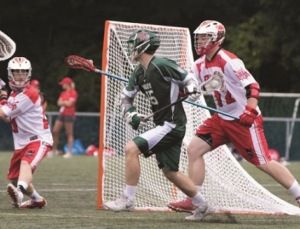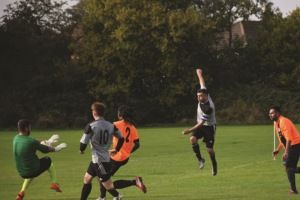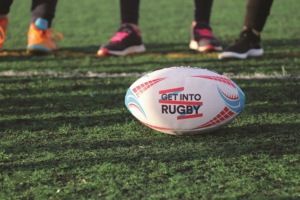News
This sporting life – from lacrosse to rugby via roller skates
This article is more than 7 years old.
Why not keep fit and have fun at the same time?

Lacrosse is often regarded as ‘the fastest game on two feet’
One of the best ways to settle into life in a new country and also meet new people is to join a sports club.
The Copenhagen area has lots of them and some cater especially for internationals, so there are good opportunities to keep up with the sports from back home, should you so wish.
Here are a few suggestions for the sports-minded new arrival to Denmark, but many other sports take place in the Copenhagen area and can be found by a diligent search of the internet.
Netball
Derived from basketball but with no dribbling and exclusion zones, this sport requires you to be quick on your feet – reaction, precision and co-ordination are vital. Plus it’s really fun and can be enjoyed by men and women together. Copenhagen netball club offers an annual membership for 450 kr per year and promises fun and social activities on the side, so it’s a good place to start your ‘net’ work. You can try out twice for free, and if you’re ready to join, training is open for everyone – experienced or uninitiated. Training is held in Bellahøj on Wednesdays at 20:00. Contact: copenhagennetballclub@gmail.com, netball.dk
Cricket
Part of the Danish Cricket Federation, Copenhagen Cricket Club offers training for adults and children alike with teams for senior, youth and junior players. Training takes place in Brønshøj both in winter and summer, with morning and evening training for juniors and youth, and evening and weekend meet-ups for the senior teams. The club also offers tutoring for young people and has an integration-orientated philosophy. Contact: info@copenhagencricketclub.dk, copenhagencricketclub.dk
Softball
Baseball is hard to find in Denmark, but internationals and Danes make do with the next best thing, softball, and there’s no better club in the capital than Gladsaxe Softball Club. As well as offering fun and competitive games to its adult members, the club also runs a number of different youth sides and is always looking for members. A basis membership costs 250 kr and includes up to 3 months training. Contact: gsk-softball.dk
Lacrosse
Originally played by Native Americans, Canada’s national sport is often referred to as ‘the fastest game on two feet’. It was brought to Denmark in 2002 by a couple of enthusiasts who work hard to keep it cheap and appealing – hence the rather low membership fee of 250kr every three months, while exchange students get a discount. Copenhagen Lacrosse, the country’s oldest club, trains twice a week at Valby Idrætspark over the summer, and once a week indoors over the winter. Both men’s and women’s teams average two games per month over the summer season, and there is the possibility of attending a tournament in Berlin or Amsterdam. All equipment is supplied by the club. Contact: info@copenhagenlacrosse.com, copenhagenlacrosse.com
Roller derby
Roller derby is a fast-paced sport for anyone who enjoys speed and are is not afraid of a few hard knocks. Good balance, determination, a decent pair of rollerskates – plus knee- and elbow pads, wristguards and a helmet (bike or skater) is all you need. The two teams and a junior team are open for ‘fresh meat’ in September and February. See the official webpage and find out how else you can get involved until then. A membership currently costs 125 kr per month and it is possible to ‘try before you buy’. Contact: copenhagenrollerderby.com
American football
The Copenhagen Towers, who were founded in Gentofte in 1990, have just had a spectacular season in 2017 and that may sound a tad intimidating. Nevertheless, American football could be the sport for you, and you’ll never know until you give it a try. There are also lots of youth teams should your kids fancy their chances. Contact: headcoach@copenhagen-towers.dk; copenhagen-towers.dk
Football
Founded in 1982, international football club Copenhagen Celtic has close to 100 members representing at least 30 different countries, providing a great social base to them all. Whether you choose 11 or 7-a-side football, in 2018 there will be 8 active squads catering for all age levels. During winter, indoor football is also an option. Most of the training takes place in the evenings at Valby Idrætspark. New players are always welcome (free trials are the norm) and the subscription fees for a full season are 1,200 kr for the 11-man teams and 1,100kr to play sevens. Contact: copenhagenceltic@gmail.com, copenhagenceltic.com
Aussie rules
Australian rules football has established itself well in Denmark – so well in fact that it has a league of its own. Just like other sports brought over by expats, it is equally enjoyed by Danes as well. There are three men’s teams in the Copenhagen area – Copenhagen Barracudas, Copenhagen Giants and Farum Cats, plus a women’s team – the Farum Wildcats. Training sessions for the Barracudas take place twice a week from 18:00-20:00 at Valby Idrætspark, in summer (Apr-Sept) on Tuesdays and Thursdays and in winter (Nov-March) on Mondays and Wednesdays. Contact: bcudas@gmail.com, cphaf.dk.
Rugby union
The Exiles are a rugby union team who welcome not only students and academics, but all internationals passionate about rugby. The club is based in Kongens Lyngby on the premises of the Danish Technical University. Exiles train twice a week. Winter training is on Tuesdays indoors at DTU (Women: 18:00-19:30/Men’s 19:30-21:00) and Saturdays outdoors at Lyngby Stadium from 15:00-17:00. Summer Training is Tuesdays and Thursday at DTU (outdoors) from 18:00-20:00. Membership fees vary between 300 and 1,000 kr depending on the length of the subscription, age and employment status of the player. If you’re not sure whether or not rugby union is something for you, try it out for a month free of charge first! Contact: exiles.dk, facebook.com/ExilesRUFC
Gaelic football
Gælic football mixes football goals and rugby tackles, gets your blood racing and develops toughness and co-ordination skills. The Gaelic Football Association in Copenhagen offers not only a good opportunity for exercise and competition but also a strong network and community for its members, from barbecue gatherings to help finding a place to live. And as all the games are played against foreign teams, the club tends to visit at least two European cities a season.
Outdoor training takes place from April to October on Tuesday evenings from 17:55 near Artillerivej 190. Indoor training for the winter season (Nov-Apr) is on Tuesday evenings from 20:00 at Hvidkildevej 64, Cph NV, though this is subject to available halls. Other activities include numerous club subsidised tournaments around Scandinavia and Europe. Club socials are a regular occurrence, with the main event being the Christmas party in early December. A year’s membership costs 400 kr per year for players, 200 for students/unemployed and for non-players, 150 kr. Email: secretary.copenhagen.europe@gaa.ie. Website: copenhagengaa.com. You can also find them on Facebook at CPHGAA.












































